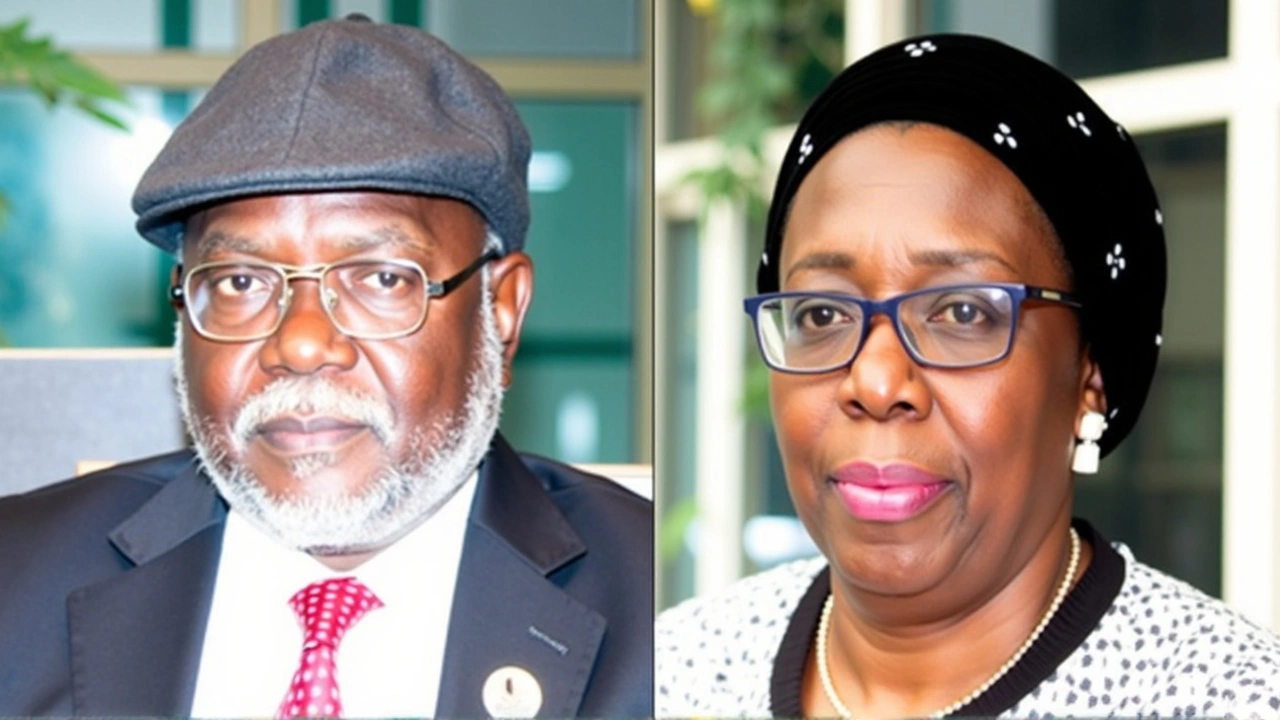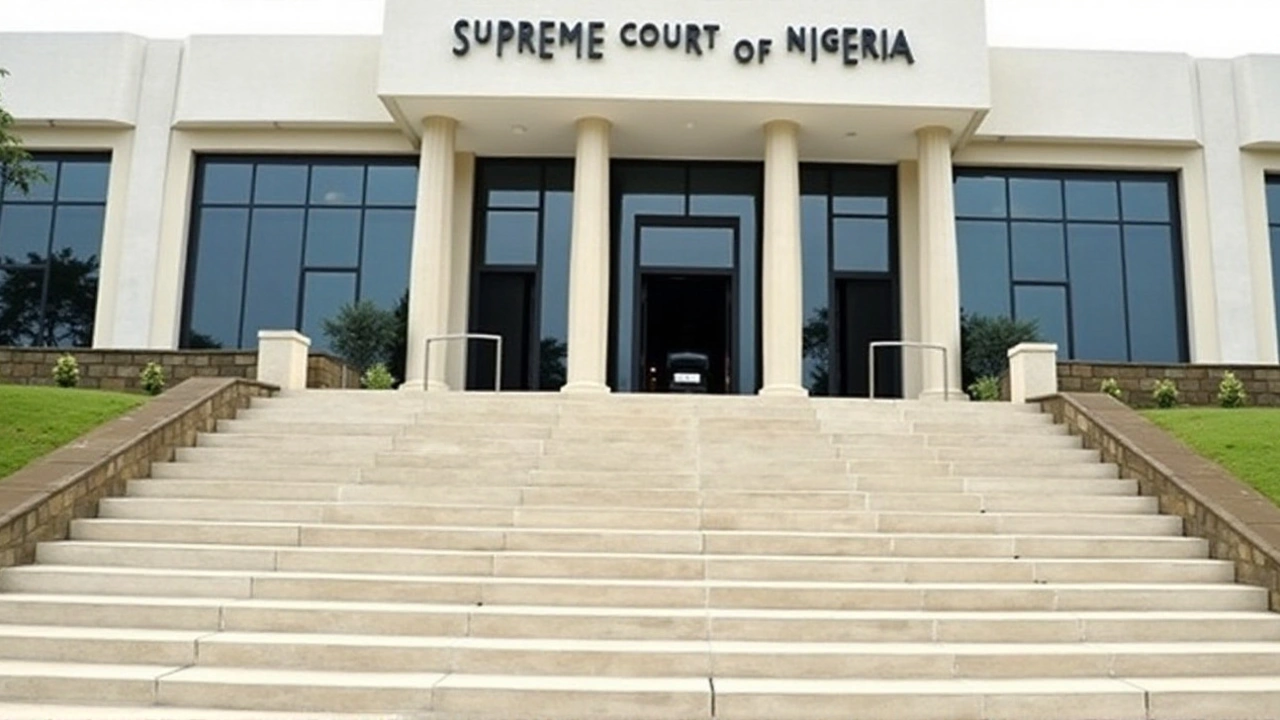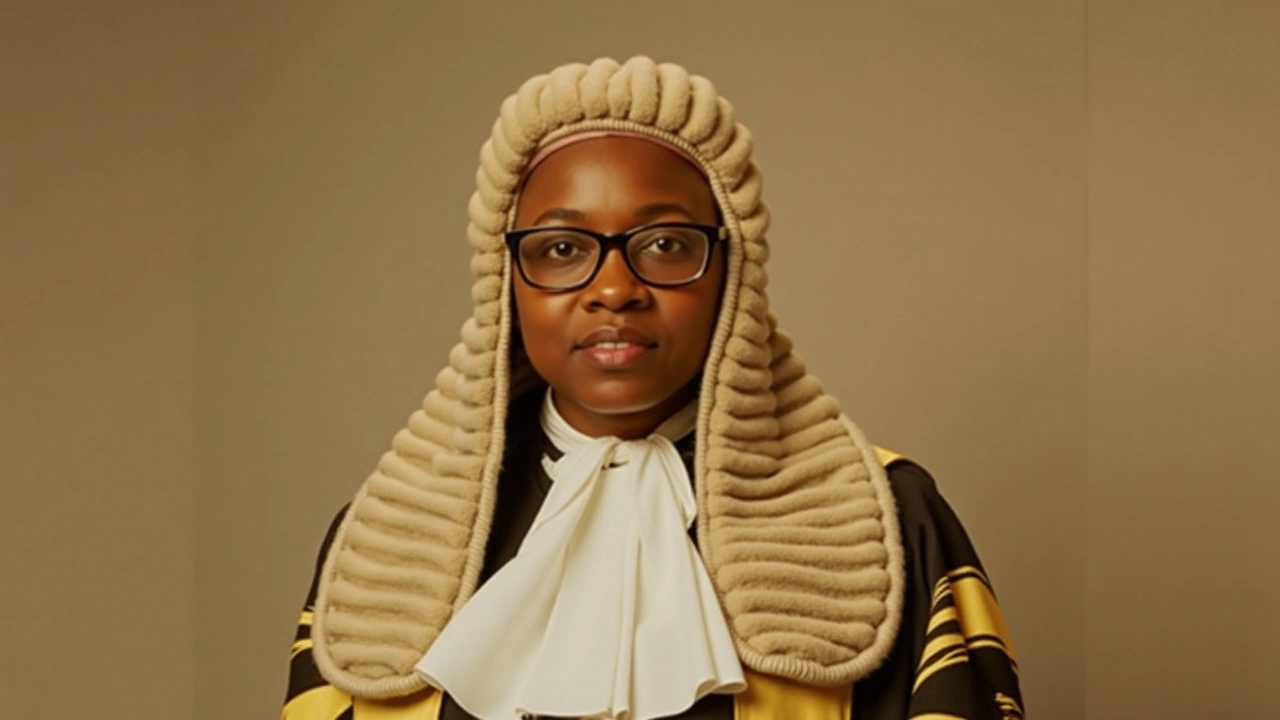Analyzing the Future of Nigeria's Judiciary from Ariwoola to Kekere-Ekun
 Aug, 16 2024
Aug, 16 2024
Nigeria's judiciary is on the cusp of a significant transition as Justice Olukayode Ariwoola is set to retire on August 22, 2024. His successor, as recommended by the National Judicial Council (NJC), is expected to be Justice Kudirat Kekere-Ekun. This change at the apex of the nation's judicial system marks both an end and a beginning, presenting an opportunity to reflect on past accomplishments and anticipate future directions.
Justice Olukayode Ariwoola: A Tenure of Milestones
Justice Olukayode Ariwoola's ascent to the role of Chief Justice of Nigeria (CJN) followed the resignation of Justice Tanko Muhammad. His tenure was marked by considerable achievements, most notably ensuring that for the first time in decades, the Supreme Court was operating with its full complement of 21 justices. This full staffing was crucial as it significantly mitigated the court's overburdened docket, enabling justices to delve deeper into legal analyses and produce more rigorous opinions.
Before becoming CJN, Ariwoola had a distinguished career marked by integrity and resilience. His tenure wasn't without challenges; he had to tackle an overloaded system burdened by a backlog of cases. However, his efforts to streamline judicial processes and introduce administrative efficiencies have been lauded. These measures have not only enhanced the court's capacity to deliver timely justice but have also bolstered public confidence in the judiciary.
Challenges Faced During His Tenure
Ariwoola's tenure came with its share of hurdles, including navigating accusations and grievances from within the judiciary. His predecessor, Justice Tanko Muhammad, resigned amid allegations of corruption and poor working conditions levied by 14 justices of the Supreme Court. This turbulent backdrop required Ariwoola to engage in comprehensive reforms and to foster an environment where justices felt secure and valued in their roles.
In addition to internal challenges, Ariwoola's leadership saw the judiciary grappling with external pressures such as political interference and public scrutiny. His approach to these issues, prioritizing judicial independence and the rule of law, has been critical in sustaining the judiciary’s credibility. As his tenure draws to a close, his legacy is one of institutional strengthening and robust leadership.

Justice Kudirat Kekere-Ekun: The New Era
Designated to succeed Ariwoola, Justice Kudirat Kekere-Ekun brings with her a wealth of experience and a profound understanding of the law. Known for her steadfastness and judicial acumen, Kekere-Ekun's career trajectory is impressive. She began her legal journey as a Senior Magistrate Grade II in 1989 and made her way to the Supreme Court by 2013.
If her appointment goes through, Kekere-Ekun will become only the second female Chief Justice of Nigeria, following in the footsteps of Justice Aloma Mukhtar. Her rise is a testament to her distinguished service and the traditions of seniority within Nigeria's judiciary. Her record suggests a commitment to integrity, diligence, and progressive judicial thought.
Expectations and Anticipated Reforms
The incoming CJN is expected to build on the reforms initiated by her predecessor. Among her priorities will likely be addressing the lingering issues of case backlog and ensuring that the Supreme Court operates efficiently. Moreover, Kekere-Ekun's tenure could see improved conditions for justices and judicial staff, as well as enhanced training and development programs to keep the judiciary at the forefront of legal innovation.
Given her extensive background and reputation, Kekere-Ekun is also poised to champion greater judicial independence. This will be critical amid ongoing challenges related to political pressures and the public's demand for accountability and transparency. Her leadership will be instrumental in navigating these complexities and steering the judiciary towards a future where justice is both accessible and equitable.

The Broader Implications for Nigeria's Judicial System
The transition from Ariwoola to Kekere-Ekun is more than a mere change in leadership; it represents a critical juncture for Nigeria's judiciary. The reforms and practices established during Ariwoola's tenure set a solid foundation, but much work remains to be done. Kekere-Ekun's anticipated ascension is seen by many as a hopeful step towards continued progress and reform.
This period of transition offers a unique opportunity to address deep-seated issues within the judicial system. Tackling case backlogs, improving working conditions, and ensuring judicial independence are just a few of the challenges that lie ahead. Equally important will be fostering a culture of transparency and accountability to strengthen public trust in the judiciary.
Furthermore, the role of the judiciary in safeguarding democracy and upholding the rule of law cannot be overstated. As Kekere-Ekun steps into her new role, the expectations will be high for her to maintain the integrity of the judicial process amidst a politically charged environment. Her decisions and reforms will have long-lasting impacts on the nation's legal landscape.
Looking Ahead
As Nigeria stands on the brink of this judicial transition, the future appears cautiously optimistic. Ariwoola's tenure has shown that with the right leadership, significant improvements can be made within the system. The appointment of Kekere-Ekun, with her extensive legal expertise and unwavering resolve, promises to continue this trajectory of reform and progress.
In the coming years, Nigeria's judiciary will undoubtedly face its share of challenges. However, with dedicated leadership and a commitment to justice, the judicial system can continue to evolve and better serve the needs of the Nigerian people. The transition from Ariwoola to Kekere-Ekun marks a significant chapter in this ongoing journey towards a more efficient, transparent, and just legal system.

Michael Laffitte
August 16, 2024 AT 19:53What a pivotal moment for Nigeria's courts.
sahil jain
August 27, 2024 AT 05:53Seeing a woman ascend to the CJN seat is electrifying! The judiciary needs that fresh perspective and the momentum she brings could finally crush the lingering case backlog. It's a bold stride toward gender parity and institutional vigor.
Bruce Moncrieff
September 6, 2024 AT 15:53The retirement of Justice Ariwoola marks the end of an era that saw the Supreme Court finally operating at full capacity. His tenure was stamped with a drive toward procedural efficiency that many had thought impossible. By filling all 21 seats, the Court could finally breathe beyond the perpetual backlog. Ariwoola’s reforms, from docket management to digital case filing, were a breath of fresh air for the legal community. He also faced internal dissent, yet he kept the bench united enough to push through critical changes. The political pressure that constantly looms over the judiciary was met with a steadfast commitment to independence. Observers noted that his calm demeanor helped defuse tense moments in judgment sessions. Moreover, his emphasis on judicial training has begun to bear fruit in lower courts. The public’s confidence, though still fragile, showed measurable improvement during his years. While no leader is perfect, Ariwoola’s legacy is undeniably a step forward. Some critics argue that the reforms were superficial, but the data on case resolution times tells another story. The upcoming appointment of Justice Kekere‑Ekun could capitalize on this momentum. Her record suggests she will not merely maintain but amplify these gains. It will be crucial for her to address lingering case backlogs with the same vigor. Ultimately, the judiciary’s future hinges on sustaining the balance between reform and tradition that Ariwoola began.
Dee Boyd
September 15, 2024 AT 22:06From a jurisprudential standpoint, Ariwoola’s stewardship introduced a paradigm shift in docket management, leveraging procedural harmonization and institutional capacity building. The restoration of full bench composition facilitated a more robust jurisprudential output, enabling precedent‑setting opinions that reinforce the rule of law. However, the latent systemic inertia still demands vigilant oversight to prevent regression.
Carol Wild
September 25, 2024 AT 04:19While Ariwoola’s contributions are laudable, one must not overlook the entrenched bureaucratic red tape that persists beneath the surface. The subtle power dynamics between the executive and the bench continue to whisper doubts into the corridors of justice. Moreover, the incremental nature of procedural reforms often masks deeper institutional malaise. Critics argue that without a comprehensive overhaul, these measures are but band‑aid on a festering wound. The judiciary’s credibility hinges upon transparent appointment processes, not just the filling of vacant seats. In this light, Kekere‑Ekun’s impending leadership bears a weighty responsibility to transcend mere continuity.
Rahul Sharma
October 4, 2024 AT 10:33Indeed, the transition presents an unprecedented opportunity, for systemic overhaul, for capacity building, for reinforcing judicial independence, and for restoring public trust; each of these pillars must be addressed concurrently, not in isolation, to achieve sustainable reform.
Emily Kadanec
October 13, 2024 AT 16:46People often forget that the Supreme Court’s docket had been clogged for decades, and that Ariwoola’s policies were the first real attempt to streamline it. It’s not just about filling seats; it’s about instituting case‑management protocols that actually work. Definately, if Kekere‑Ekun keeps pushing these reforms, we’ll see a noticeable drop in pending cases.
william wijaya
October 22, 2024 AT 22:59Absolutely, the momentum from Ariwoola’s tenure sets a solid foundation; building on that with targeted training programs and tech integration can usher in a new era of efficiency. The judiciary’s future looks brighter when leaders prioritize both justice and administrative excellence.
Lemuel Belleza
November 1, 2024 AT 04:13Nice overview of the transition.
faye ambit
November 10, 2024 AT 10:26The judiciary, at its core, is the living embodiment of societal conscience. A change in its helm signals not just procedural adjustment but a moral recalibration. As Kekere‑Ekun steps in, the nation watches for a synthesis of tradition and progressive thought, hoping that justice becomes both accessible and enlightened.
Subhash Choudhary
November 19, 2024 AT 16:39yeah, totally feel the vibe. her track record screams dedication, so we’re probably in for some solid changes.
Ethan Smith
November 28, 2024 AT 22:53Indeed, the anticipated reforms should focus on measurable metrics such as case resolution time, staff satisfaction, and transparency indices. These data‑driven approaches will provide concrete evidence of progress.
Evelyn Monroig
December 8, 2024 AT 05:06Don’t be fooled – this whole “reform” narrative is just a smokescreen for deeper power grabs. The elite will use the new CJN to cement their control while the public remains in the dark.
Gerald Hornsby
December 17, 2024 AT 11:19History repeats itself, and the gavel will fall. 🙂
Hina Tiwari
December 26, 2024 AT 17:33I think its super important that the new chief focus on training judges, and also on making the court more transperant for everyone.